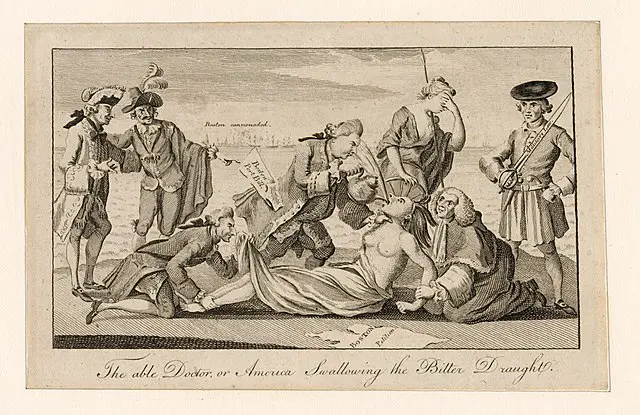Intolerable Acts and War
In the late 1700s, the British Parliament passed laws that taxed the colonists in the New World. The colonists began to revolt against the British as they were being taxed without any representation in Parliament for the 13 colonies.
One of the acts of rebellion was the Boston Tea Party when the colonists, dressed as Native Indians, threw British tea overboard on a ship. The retaliation for that and other rebellious actions by the British was the 1774 passing of what the colonists called “Intolerable Acts.”

The British thought that these acts would put fear in the hearts of the colonists and get them under control. These were new laws against the colonists, and they called them by this name because they could not tolerate the unfair laws. These acts pushed the colonists further towards total revolt and a desire for independence that led to the Revolutionary War.
The Five “Intolerable” Acts:
The Boston Port Act was punishment for the Boston Tea Party and was directed to the entire city of Boston. It required that all Boston ports be closed to any ships until the colonists paid for the team that was dumped into the Boston harbor. The harbor was the central shipping area for items from the British as well as other colonies. Some in Boston felt the law was unfair as it punished everyone in Boston and not just those that were guilty of the “crime.”
The Massachusetts Government Act was designed to realign the power of the local government so that it gave more power to the governor, who was appointed by the British government and removed power from the colonists themselves.
It reduced the number of town meetings that could be held to one per year and changed the status of electing government officials to one that would only allow the British to appoint these officials. The act was to set an example of Boston and create a state of fear for all of the other colonies that laws could be imposed on them if they rebelled against the Crown.
The Administration of Justice Act changed the way that capital trials would be held for government officials. Instead of holding local trials, it gave the governor the power to relocate these specific trials to Britain.
This not only gave more power to the governor but also required witnesses that needed to testify to travel to Britain. The restrictions against the witnesses created a situation where it would be almost impossible to convict. This act was called the “Murder Act” by the colonists as they said it would give officials the power to get away with murder.
The Quartering Act of 1774 was an expansion on an earlier 1765 version of the Quartering Act that required the colonies to provide quarters or “barracks” for the British soldiers. If there weren’t barracks available, the colonists were to supply other building types such as hotels, homes, or barns for the soldiers to be housed.
The Quebec Act was designed to expand the power of the British so that it included the area south of the Ohio Valley and defined the Province of Quebec as a Roman Catholic province.
This act was thrown into the group even though it didn’t relate to the Boston Tea Party. Colonists were angry about this act as they didn’t want to have a Catholic province so close in the north and didn’t want to lose the Ohio territory.
By passing the Intolerable Acts, the British pushed the colonists closer to total rebellion. The acts removed some of the freedoms and acted as yet another way that the colonists would unite against the British government.
Q&A
Why did the British pass the Intolerable Acts?
As punishment for the Boston Tea Party
What were the five laws in the Intolerable Acts?
The Boston Port Act, The Massachusetts Government Act, The Administration of Justice Act, The Quartering Act of 1774, The Quebec Act
Which act didn’t have anything to do with the Boston Tea Party?
The Quebec Act>T
What effect did the British think the Intolerable Acts would cause against the colonists?
Fear and getting them under control
What real effect did the Intolerable Acts have by the colonists?
Caused them to unite further against the British government
Why did the colonists call these five laws the “Intolerable Acts”?
They could not tolerate the unfair laws



